
Under new rules corporations and unions will no longer be able to donate to municipal politicians in British Columbia and individual donations will be capped.
“For too many years under the previous government big money dominated politics,” said Selina Robinson, a former Coquitlam city councillor who is now the minister of municipal affairs and housing, after introducing the Local Elections Campaign Financing Amendment Act in the legislature. “It’s been a wild west in political financing here and people want change.”
The bill sets a cap of $1,200 each year for individual donations to any one candidate or to candidates running as part of the same elector organization, or party. A donor could, however, give $1,200 to multiple candidates if they are running independently and not part of an official slate or to candidates in several municipalities.
The bill also bans all donations from outside of the province, as well as those from corporations and unions.
Robinson said elections are a chance for people to make their voices heard and that the changes put people back at the centre of local elections. “These amendments will strengthen local democracy in our province. It’s better for candidates, it’s better for voters, quite simply it’s better for B.C.”
Concerns about municipal election financing go back many years. A decade ago The Tyee published City Hall for Sale, a series exposing the “lax regulations that allow virtually unlimited contributions with little public scrutiny.”
Union of British Columbia Municipalities president Wendy Booth said she hopes the new rules will be in place ahead of the 2018 local elections. “It’s a credit to the government they are acting early in their mandate to respond to the issues we’ve identified,” she said. “Elections shouldn’t be won or lost on who has the most money ... We think these changes will level the playing field for candidates.”
Oak Bay Mayor Nils Jensen said the rule change might get lost in other news, but that it’s an important advance. “This is the evolution of democracy in British Columbia,” he said. “This is a victory for democracy. This is a victory for the rule of the people.”
In the legislature, Robinson said the new rules follow the government’s action to get big money out of provincial politics. However, while provincial parties will receive public financing as they adjust to the donation restrictions, municipal politicians will not. “Public financing does not currently exist at the local level,” Robinson said.
She also said that the bill changes the definition of “third-party advertiser” so that people expressing their views on a small scale will no longer be required to register with Elections B.C. or to disclose information about their spending on election advertising.
“This amendment is intended to help ensure that people who put up homemade signs, for example, are not considered a third-party advertiser and are, therefore, not subject to these rules,” she said.
Andrew Weaver, leader of the B.C. Green Party, released a statement welcoming the changes. ![]()
Read more: Politics, BC Politics















Tyee Commenting Guidelines
Comments that violate guidelines risk being deleted, and violations may result in a temporary or permanent user ban. Maintain the spirit of good conversation to stay in the discussion.
*Please note The Tyee is not a forum for spreading misinformation about COVID-19, denying its existence or minimizing its risk to public health.
Do:
Do not: